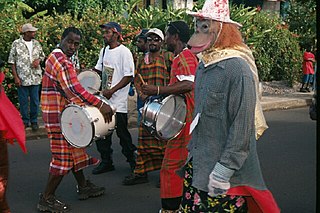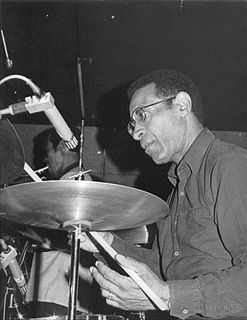Jazz is a music genre that originated in the African-American communities of New Orleans, Louisiana, United States, in the late 19th and early 20th centuries, with its roots in blues and ragtime. Since the 1920s Jazz Age, it has been recognized as a major form of musical expression in traditional and popular music, linked by the common bonds of African-American and European-American musical parentage. Jazz is characterized by swing and blue notes, complex chords, call and response vocals, polyrhythms and improvisation. Jazz has roots in West African cultural and musical expression, and in African-American music traditions.
World music is a musical category encompassing many different styles of music from around the world, including traditional music, quasi-traditional music, and music where more than one cultural tradition intermingles. World music's inclusive nature and elasticity as a musical category pose obstacles to a universal definition, but its ethic of interest in the culturally exotic is encapsulated in fRoots magazine's description of the genre as "local music from out there".
As in other countries, the musical production in Tanzania is constantly undergoing changes. Music listened to by Tanzanians today stretches from traditional African music or the string-based taarab to a distinctive hip hop known as bongo flava.
There are many styles of traditional and modern music of Ghana, due to Ghana's cosmopolitan geographic position on the African continent. The best known modern genre originating in Ghana is Highlife.So many years, Highlife was the preferred music genre until the introduction of Hiplife and many others.

The music of Indonesia demonstrates its cultural diversity, the local musical creativity, as well as subsequent foreign musical influences that shaped contemporary music scenes of Indonesia. Nearly thousands of Indonesian islands having its own cultural and artistic history and character. This results in hundreds of different forms of music, which often accompanies by dance and theatre.

The music of Dominica includes a variety of genres including all the popular genres of the world. Popular music is widespread, with a number of native Dominican performers gaining national fame in imported genres such as calypso, reggae, soca, kompa, zouk and rock and roll. Dominica's own popular music industry has created a form called bouyon, which combines elements from several styles and has achieved a wide fanbase in Dominica. Groups include WCK, Native musicians in various forms, such as reggae, kadans (Ophelia Marie, and calypso, have also become stars at home and abroad.
The music of Barbados includes distinctive national styles of folk and popular music, including elements of Western classical and religious music. The culture of Barbados is a syncretic mix of African and British elements, and the island's music reflects this mix through song types and styles, instrumentation, dances, and aesthetic principles..

The traditional music of Mauritius is known as sega music, though reggae, zouk, soukous and other genres are also popular, but the latter genres do not originate from Mauritius, despite famous local singers such as Kaya, who successfully combined Sega Music Reggae Music to create Mauritian Seggae. Well-known traditional sega singers from Mauritius include Ti Frére, Marlene Ravaton, Serge Lebrasse, Michel Legris and Fanfan.
Fiji is an island nation in the Pacific Ocean. Though geographically Melanesian, the music of Fiji is more Polynesian in character. Nevertheless, Fijian folk styles are distinct in their fusion of Polynesian and Melanesian traditions. Folk music is dominated by vocal church music, as well as dances characterized by rich and dull harmony and complex percussion made from slit drums or natural materials, like drums!
The Flying Bulgars is a Canadian folk music band, who play original music rooted in the folk and celebration music of Jews originating in Eastern Europe. The band's music adds elements of rock, jazz and salsa.
Balkan music is a type of music found in the Balkan region of Southeastern Europe. The music is characterised by complex rhythm. Famous bands in Balkan music were Taraf de Haïdouks, Fanfare Ciocarlia, and No Smoking Orchestra.
Celtic fusion is an umbrella term for any modern music which incorporates influences considered "Celtic", or Celtic music which incorporates modern music. It is a syncretic musical tradition which borrows freely from the perceived "Celtic" musical traditions of all the Celtic nations, as well as from all styles of popular music, it is thus sometimes associated with the Pan-Celtic movement. Celtic fusion may or may not include authentic traditional music from any one tradition under the Celtic umbrella, but its common characteristic is the inspiration by Celtic identity.
Tunde Jegede is a composer and multi-instrumentalist in contemporary classical, African and pop music, who is of Nigerian descent and born in England and as a child travelled to Africa to learn the art of the kora. He is a producer-songwriter and has worked across several genres both as a performer and producer. He is a master kora player, and specializes in the West African classical music tradition which dates from the period of Sundiata. His sister is Sona Jobarteh, who is the first female kora virtuoso to come from a griot family. His father is Nigerian artist Emmanuel Taiwo Jegede.
Lenny Seidman is a tabla player, a composer, a co-director of the Spoken Hand Percussion Orchestra, and a World Music/Jazz curator at the Painted Bride Art Center in Philadelphia.

Dance in Indonesia reflects the country's diversity of ethnicities and cultures. There are more than 1,300 ethnic groups in Indonesia. Austronesian roots and Melanesian tribal forms are visible, and influences ranging from neighboring Asian and even western styles through colonization. Each ethnic group has its own dances: there are more than 3,000 original dance forms in Indonesia. The old traditions of dance and drama are being preserved in the many dance schools which flourish not only in the courts but also in the modern, government-run or supervised art academies.

The Orchid Ensemble is a Canadian musical ensemble formed in 1997 in Vancouver. It is led by Lan Tung from Taiwan on erhu, with Yu-Chen Wang from Taiwan on guzheng and Jonathan Bernard from Canada on various percussion instruments. Former guzheng players include Haiqiong Deng, Mei Han, Geling Jiang, and Bei Bei He.

Jazz drumming is the art of playing percussion in jazz styles ranging from 1910s-style Dixieland jazz to 1970s-era jazz fusion and 1980s-era Latin jazz. The techniques and instrumentation of this type of performance have evolved over several periods, influenced by jazz at large and the individual drummers within it. Stylistically, this aspect of performance was shaped by its starting place, New Orleans, as well as numerous other regions of the world, including other parts of the United States, the Caribbean, and Africa.
Punk jazz is a music genre that describes the amalgamation of elements of the jazz tradition with the instrumentation or conceptual heritage of punk rock. John Zorn's band Naked City, James Chance and the Contortions, Lounge Lizards, Universal Congress Of, Laughing Clowns, Midori are notable examples of punk jazz artists.

Jazz – musical style that originated at the beginning of the 20th century in African American communities in the Southern United States, mixing African music and European classical music traditions.
Fusion Jonda is a Puerto Rican band that blends the Caribbean music with gypsy-flamenco sounds, melodies and rhythms. The band also centers its music in a combination of Afrobeat, jazz, Arabic music, and Indian music elements achieving a contemporary approach.






